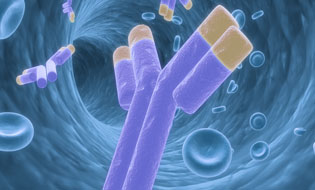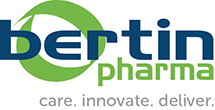(Unwanted) Immunogenicity

Bertin Pharma has more than two decades of experience in Immunogenicity, both in the direction to reveal a pharmacological efficacy and in the deleterious direction i.e. neutralization of the biological activity of a biologics such as therapeutical proteins better known under the term “Anti-Drug Antibody (ADA).
Focus
- Our Know-How & Technologies aim to answer to the following questions…
- Our expertise permits to undertake…
- For this & for example, we use…
- In vitro & in vivo Predictive Immunogenicity Assays
Our Know-How & Technologies aim to answer to the following questions…
- what is the pharmacokinetic (PK) of a therapeutic protein?
- are there host antibodies and the emergence of ADA against a therapeutic protein?
- and if yes, do they modify its concentration and/or PK and/or PD?
- what are the characteristics & concentrations of such antibodies?
- do they neutralise drug efficacy?
- do they cause side-effects such as allergic or anaphylactic reactions and/or autoimmune diseases?
Our expertise permits to undertake…
- implementation of preclinical studies in the most relevant animal species (in-house or in collaboration with our partner, CERB)
- set-up and development of specific assays in various species & biological media
- validation studies according to ICH & EMEA guidelines and FDA note for guidance
- experiments in GLP conditions
For this & for example, we use…
- a patented AChE revelation technology with several advantages over other enzymes conventionally used in EIAs i.e. kinetics superiority, low background, versatility, high sensibility & precision
- our platform dedicated to production of monoclonal & polyclonal antibodies
- specific standard & original EIA formats
- titration of positive samples, immunodepletion or competition assays as well as immunoblots & Surface Plasmon Resonance (SPR) assays used as confirmatory assays
- various specific binding-, enzyme- & cell-based assays
In vitro & in vivo Predictive Immunogenicity Assays
- in vitro: Biotherapeutic candidates or peptides corresponding to previously identified epitopes are tested in vitro using a T cell proliferation assay using peripheral blood mononuclear cells (PBMC) isolated from different blood donors (between 20 and 50) with various HLA. Then, in a second step, we can assess the processing of these biotherapeutic candidates as antigen by dendritic cells using DC-T cell coculture assays. Dendritic cells are obtained by diffentiation of human monocytes previously isolated by CD14+ cell sorting in a PBMC population.
- in vivo: Immunogenicity is explored using mice humanized for the immune system using human CD34+ hematopoietic progenitor cells (In collaboration with Axenis).
